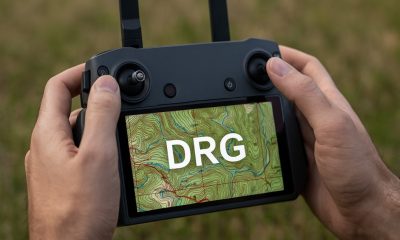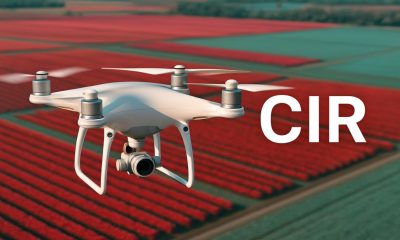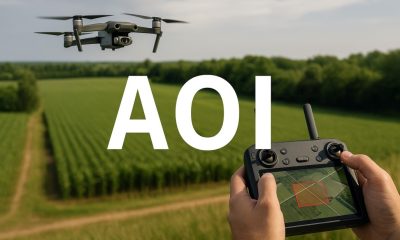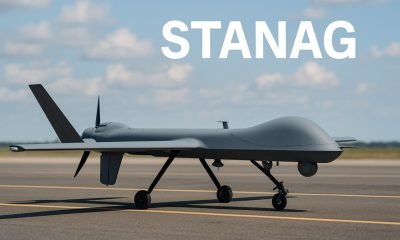- Acronym Guide
- AAM
- ABS
- AC
- ACAS
- ADS-B
- AFAC
- AGL
- AI
- AIM
- ALS
- AM
- AMA
- ANSP
- AOI
- APPI
- AUV
- AUVSI
- ARPAS-UK
- ASTM
- ATC
- BVLOS
- CAA
- CAAC
- CAB
- CASA
- CATT
- CBO
- CBR
- CBRN
- CDMA
- CDR
- CFR
- CIR
- COA
- COMINT
- CORS
- COTP
- COTR
- CPTED
- CV
- C2
- DAA
- DEM
- DFI
- DFS
- DGCA
- DHS
- DOD
- DPA
- DPEs
- DRG
- DRO
- DSM
- DSMX
- DSP
- DSSS
- DTM
- EASA
- EFT
- EO
- EOD
- EO/IR
- ELINT
- EMI
- ESC
- EVLOS
- eVTOLs
- FAA
- FCC
- FCS
- FHSS
- FICCI
- FLIR
- FOB
- FOV
- FPS
- FPV
- GBDAA
- GCP
- GCS
- GDPR
- GML
- GNSS
- GPS
- GSD
- GVC
- HDR
- HOGE
- IACRA
- ICAO
- ICS
- IMU
- INS
- IR
- ISA
- ISR
- ITU
- JARUS
- LAAMS
- LAANC
- LAATM
- LAI
- LBA
- LIDAR
- LOS
- LSALT
- MAC
- MAVLink
- MLIT
- MMS
- MSL
- MTOM
- NDAA
- NCSL
- NFZ
- NIST
- NMEA
- NOTAM
- NPA
- NPRM
- NTIA
- OBIA
- OEM
- OFDM
- OOP
- PASM
- PAV
- PCV
- PdM
- PEC
- PIC
- PID
- PIPL
- PLD
- PM
- PN
- PPK
- PPS
- PSM
- PWM
- UAM
- UAOP
- UAS
- UASTM
- UAV
- UCAVs
- UHD
- UHF
- USV
- UTM
- RAIM
- RCC
- RCS
- RFI
- ReOC
- RePL
- RMS
- ROI
- RPAS
- RPC
- RTH
- RTK
- SaR
- SAR
- SARP
- SBAS
- S.Bus
- SBIR
- SEDENA
- SfM
- SFOC
- SIGINT
- SLAM
- SMS
- SORA
- STANAG
- STTR
- sUAS
- TCAS
- TCCA
- TFR
- TIN
- TOF
- TP
- TPS
- TSA
- VHF
- VLOS
- VTOL
Drone Acronyms
What is AFAC (Agencia Federal de Aviación Civil)?
By
Jacob StonerTable Of Contents

Definition
AFAC stands for the Agencia Federal de Aviación Civil, or Federal Civil Aviation Agency in Mexico. AFAC is the primary regulatory authority responsible for overseeing civil aviation in Mexico, ensuring compliance with national and international aviation standards. Established under the Mexican government, AFAC regulates everything from aircraft certification and pilot licensing to airspace management and aviation safety. For drone operators, AFAC provides guidelines, requirements, and permits necessary for legal drone operation within Mexican airspace.
Usage
In the context of drones, Agencia Federal de Aviación Civil sets the regulations for both recreational and commercial drone operations in Mexico. This includes defining operational limitations (such as altitude and proximity to restricted areas), establishing requirements for pilot licensing and drone registration, and specifying conditions for advanced operations like Beyond Visual Line of Sight (BVLOS) flights. For foreign operators, AFAC provides information on obtaining temporary authorizations for drone use in Mexico, ensuring compliance with local regulations.
Relevance to the Industry
AFAC’s regulations are essential for anyone planning to operate drones in Mexico. Whether for commercial applications, such as surveying, inspections, or filming, or for recreational flying, operators must comply with AFAC’s guidelines to ensure safe and lawful use. Given the increasing use of drones in Mexico for industries like agriculture, infrastructure monitoring, and tourism, AFAC plays a key role in shaping a regulatory environment that balances innovation and public safety.
How Does the Agencia Federal de Aviación Civil (AFAC) Work?
AFAC Regulatory Framework and Licensing:
- Establishing and Enforcing Aviation Regulations:
- National and International Standards: Agencia Federal de Aviación Civil is responsible for creating and enforcing aviation regulations in Mexico that align with both national policies and international standards, including those set by the International Civil Aviation Organization (ICAO). This involves developing guidelines and protocols that ensure the safe operation of manned and unmanned aircraft within Mexican airspace. AFAC’s regulatory framework covers aspects such as flight safety, operational restrictions, pilot qualifications, and aircraft certification.
- Drone-Specific Regulations: For drones, Agencia Federal de Aviación Civil has created a set of rules that differentiate between recreational and commercial operations. These rules specify requirements based on the drone’s weight, intended use, and operational environment, such as altitude restrictions, distance from populated areas, and proximity to restricted zones (e.g., airports, military installations). Operators must adhere to these guidelines to legally fly drones in Mexico.
- Certification and Licensing of Pilots:
- Drone Pilot Licensing for Advanced Operations: Commercial drone operators, particularly those conducting advanced operations like Beyond Visual Line of Sight (BVLOS) flights, must obtain a license or permit from AFAC. To qualify, pilots need to demonstrate their understanding of Mexican airspace regulations and flight safety protocols. They may also need to pass exams or complete training courses certified by AFAC to ensure they have the skills necessary for safe operation.
- Registration Requirements: AFAC requires certain drones, especially those above specific weight thresholds or used for commercial purposes, to be registered. This process includes submitting details about the drone, such as its make, model, and serial number, as well as the operator’s information. Registration helps AFAC monitor drone usage, manage airspace traffic, and maintain accountability for drone operations across Mexico.
AFAC Airspace Management and Safety Protocols:
- Coordinating Airspace Use:
- Controlled and Restricted Airspace: AFAC collaborates with other Mexican government agencies to manage and regulate access to controlled and restricted airspace zones. This coordination ensures that drones do not interfere with manned aircraft or compromise sensitive areas. Drone operators must obtain special authorization from AFAC to fly in restricted areas or near sensitive locations, such as government buildings, military sites, and public events.
- Integration of Drones into Civil Airspace: AFAC’s protocols enable the safe integration of drones into civil airspace, balancing innovation with public safety. AFAC enforces altitude limits, flight path restrictions, and time-of-day rules to minimize the risk of accidents. By managing these elements, AFAC helps prevent collisions and ensures that drones operate safely alongside traditional aircraft.
- Implementing Safety Standards and Incident Reporting:
- Operational Safety Standards: AFAC establishes safety standards that all drone operators must follow, such as maintaining line-of-sight (LOS) during flights and adhering to maximum altitude restrictions. AFAC’s standards aim to reduce risks associated with drone operations, including potential harm to people, property, and other aircraft.
- Mandatory Incident Reporting: In the event of a drone-related incident, such as equipment malfunction, collision, or loss of control, operators are required to report the event to AFAC. This reporting helps AFAC monitor and assess risks, identify trends in drone-related incidents, and develop further safety measures as needed.
AFAC Permissions for Foreign Operators and Industry Support:
- Permits for Foreign Drone Operators:
- Temporary Authorization Process: Foreign operators who wish to fly drones in Mexico must obtain temporary authorization from AFAC. This process requires the submission of relevant documentation, including proof of certification or licensing from their home country, along with information on the planned operations. AFAC reviews each request to ensure compliance with Mexican regulations and may impose additional restrictions to ensure public safety.
- Compliance with Mexican Standards: Foreign operators must comply with Mexican regulations during their stay, including operational limits and safety protocols. AFAC’s authorization process ensures that all drone activity within Mexico adheres to the same standards, maintaining safety and security in Mexican airspace.
- Supporting Drone Industry Development:
- Industry Collaboration: AFAC collaborates with local drone manufacturers, operators, and researchers to develop regulations that accommodate emerging technologies while ensuring safety. By working with industry stakeholders, AFAC helps foster a regulatory environment that supports innovation and enables safe integration of drones into various sectors, such as agriculture, infrastructure inspection, filmmaking, and environmental monitoring.
- Adapting Regulations for Growth: As drone technology advances, AFAC continuously adapts its regulations to address new challenges, such as autonomous flight, urban air mobility, and drone delivery services. This adaptive approach allows AFAC to support industry growth while safeguarding public safety and promoting responsible drone usage.
By establishing clear regulatory frameworks, managing airspace use, implementing safety protocols, and supporting industry growth, the Agencia Federal de Aviación Civil (AFAC) ensures that drone operations in Mexico are conducted safely and responsibly, aligning with both national and international aviation standards.
Example in Use
“The film production company obtained authorization from the Agencia Federal de Aviación Civil (AFAC) to conduct aerial drone filming in restricted zones within Mexico City.”
Frequently Asked Questions about AFAC (Agencia Federal de Aviación Civil)
1. What are AFAC’s main responsibilities?
Answer: AFAC oversees:
- Regulation and Licensing: Certifying pilots, aircraft, and drone operators to ensure compliance with safety standards.
- Airspace Management: Coordinating Mexican airspace to safely integrate manned and unmanned aircraft operations.
- Safety Protocols: Enforcing safety regulations for civil aviation, including drones, to prevent accidents.
2. How does AFAC regulate drone operations in Mexico?
Answer: AFAC regulates drone operations by:
- Setting Operational Limits: Specifying altitude and distance restrictions for drones near restricted areas and buildings.
- Licensing Requirements: Enforcing certification standards for commercial operators and advanced operations.
- Drone Registration: Requiring registration for drones over certain weight thresholds and for specific uses.
3. How can foreign drone operators legally fly in Mexico?
Answer: Foreign operators must:
- Obtain Authorization: Apply for a temporary permit from Agencia Federal de Aviación Civil to legally operate their drones within Mexican airspace.
- Comply with Local Regulations: Follow AFAC’s rules regarding operational limits and safety protocols during their stay.
For examples of these acronyms visit our Industries page.
As the CEO of Flyeye.io, Jacob Stoner spearheads the company's operations with his extensive expertise in the drone industry. He is a licensed commercial drone operator in Canada, where he frequently conducts drone inspections. Jacob is a highly respected figure within his local drone community, where he indulges his passion for videography during his leisure time. Above all, Jacob's keen interest lies in the potential societal impact of drone technology advancements.











